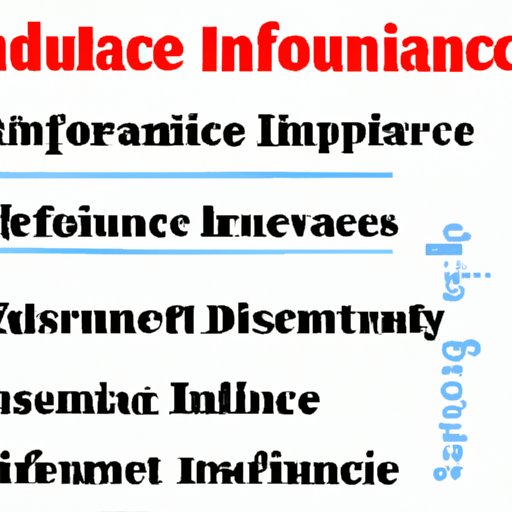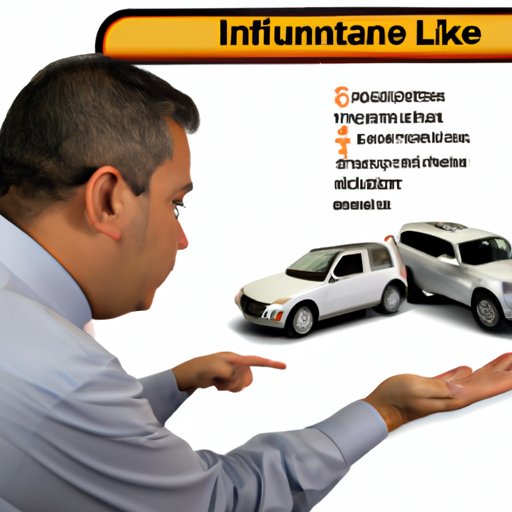Introduction
Insurance deductible is an amount of money that must be paid out-of-pocket before an insurance company will cover a claim. It is an important concept to understand when shopping for insurance, as it can have a significant impact on the cost and coverage of a policy. In this article, we will explore how does insurance deductible work and provide strategies for minimizing its impact.
Explaining Insurance Deductibles: A Guide to Understanding How They Work
Before we dive into the details of how insurance deductibles work, let’s first define what they are and why they are important.
What is an Insurance Deductible?
An insurance deductible is an amount of money that policyholders are responsible for paying out-of-pocket before their insurance company will begin to cover a claim. In other words, the deductible is the amount of money you must pay before the insurance company covers the rest of the costs associated with a claim.
How Does a Deductible Affect Coverage?
The size of the deductible will affect the extent of coverage provided by the insurance policy. The higher the deductible, the less coverage the policy will provide. For example, if you have a $500 deductible and a $1,000 claim, you will be responsible for paying the first $500 of the claim and the insurance company will cover the remaining $500. On the other hand, if you have a $1,000 deductible and a $1,000 claim, you will be responsible for paying the entire claim.
How Much is the Deductible?
The size of the deductible varies depending on the type of insurance and the policyholder’s individual circumstances. Generally speaking, the higher the deductible, the lower the premium. As such, choosing a higher deductible is one way to keep insurance premiums low.
The Basics of Insurance Deductible: What It Means and How It Affects Your Coverage
Now that we have defined insurance deductible and discussed how it affects coverage, let’s take a closer look at the different types of deductibles and how they can impact premiums and coverage limits.
Different Types of Insurance Deductibles
There are several different types of insurance deductibles, including health insurance deductibles, car insurance deductibles, and homeowner’s insurance deductibles. Each type of deductible has its own set of rules and regulations, so it is important to familiarize yourself with the specifics of each type of deductible before making a decision.
The Impact of Deductibles on Premiums
The size of the deductible will have an impact on the premiums you pay for your insurance policy. Generally speaking, the higher the deductible, the lower the premium. However, it is important to consider how much you will be able to afford to pay out-of-pocket before selecting a deductible.
Deductibles and Coverage Limits
It is important to note that the size of the deductible does not necessarily dictate the coverage limit for a policy. In other words, even if you have a high deductible, the coverage limit may still be relatively low. It is important to read the fine print of your policy to understand exactly how much coverage you have.
Strategies for Minimizing the Impact of Insurance Deductibles
While having a deductible is unavoidable, there are a few strategies you can use to minimize the impact of your deductible. Here are a few tips to keep in mind when shopping for insurance.
Shop Around for Lower Rates
One of the best ways to save money on your insurance premiums is to shop around for the best rates. Different insurers offer different rates, so it pays to compare quotes from multiple providers before making a decision. According to a study conducted by the Insurance Information Institute, “shopping around for auto insurance can save consumers an average of $859 a year.”
Raise Your Deductible
Raising your deductible is another effective way to reduce your insurance premiums. However, it is important to make sure that you can afford to pay the higher deductible if you do need to file a claim.
Look for Discounts
Many insurance companies offer discounts for certain types of policies or customers. Be sure to ask about any available discounts when shopping for insurance to see if you qualify.

An Overview of Different Types of Insurance Deductibles
Now that we have discussed some strategies for minimizing the impact of insurance deductibles, let’s take a closer look at the different types of deductibles.
Health Insurance Deductibles
Health insurance deductibles vary depending on the type of plan you have. Generally speaking, the higher the deductible, the lower the premium. However, it is important to consider how much you can realistically afford to pay out-of-pocket before selecting a deductible.
Car Insurance Deductibles
Car insurance deductibles are generally much lower than health insurance deductibles. The size of the deductible will depend on the type of coverage you select and the value of your vehicle. Generally speaking, the higher the value of the car, the higher the deductible.
Homeowner’s Insurance Deductibles
Homeowner’s insurance deductibles are usually higher than car insurance deductibles. The size of the deductible will depend on the type of coverage you select and the value of your home. Generally speaking, the higher the value of the home, the higher the deductible.

Determining the Right Size of Insurance Deductible for You
Choosing the right size of insurance deductible is an important decision that should not be taken lightly. When determining the right size of deductible for you, there are three key factors to consider: your financial situation, your risk tolerance, and your insurance needs.
Consider Your Financial Situation
When selecting a deductible, it is important to consider your financial situation. Make sure that you can realistically afford to pay the deductible if you do need to file a claim. If you cannot afford the deductible, then you may want to choose a lower deductible.
Consider Your Risk Tolerance
Your risk tolerance is another important factor to consider when selecting a deductible. If you are comfortable taking on more risk, then you may want to choose a higher deductible in order to minimize your premiums. On the other hand, if you are risk-averse, then you may want to opt for a lower deductible in order to maximize your coverage.
Consider Your Insurance Needs
Finally, it is important to consider your insurance needs when selecting a deductible. Make sure that the deductible you choose is appropriate for the type of coverage you require.

Common Mistakes to Avoid When Choosing an Insurance Deductible
Now that we have discussed the factors to consider when choosing a deductible, let’s take a look at some common mistakes to avoid.
Choosing Too Low of a Deductible
One of the most common mistakes people make when choosing a deductible is selecting one that is too low. While it is tempting to choose a low deductible in order to maximize coverage, it is important to remember that doing so will result in higher premiums.
Not Shopping Around for the Best Rate
Another common mistake people make is not shopping around for the best rate. Different insurance companies offer different rates, so it pays to compare quotes from multiple providers before making a decision.
Not Understanding the Coverage Limits
It is also important to understand the coverage limits of your policy. Even if you have a high deductible, the coverage limit may still be relatively low. Make sure to read the fine print of your policy to understand exactly how much coverage you have.
Conclusion
Understanding how insurance deductible works and how it affects your coverage can help you make informed decisions when shopping for insurance. By following the tips outlined in this article, you can minimize the impact of your deductible and maximize your coverage.
(Note: Is this article not meeting your expectations? Do you have knowledge or insights to share? Unlock new opportunities and expand your reach by joining our authors team. Click Registration to join us and share your expertise with our readers.)
